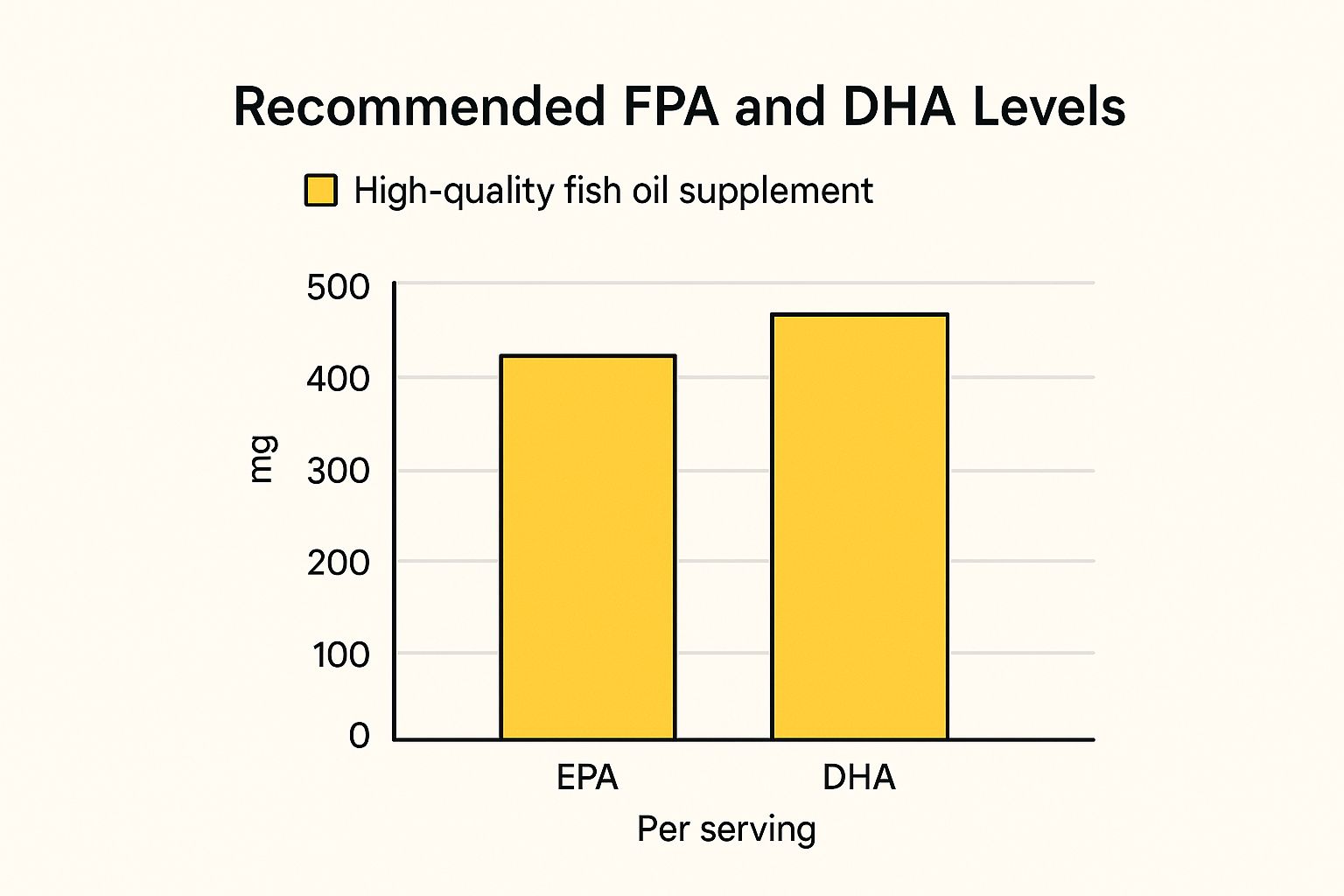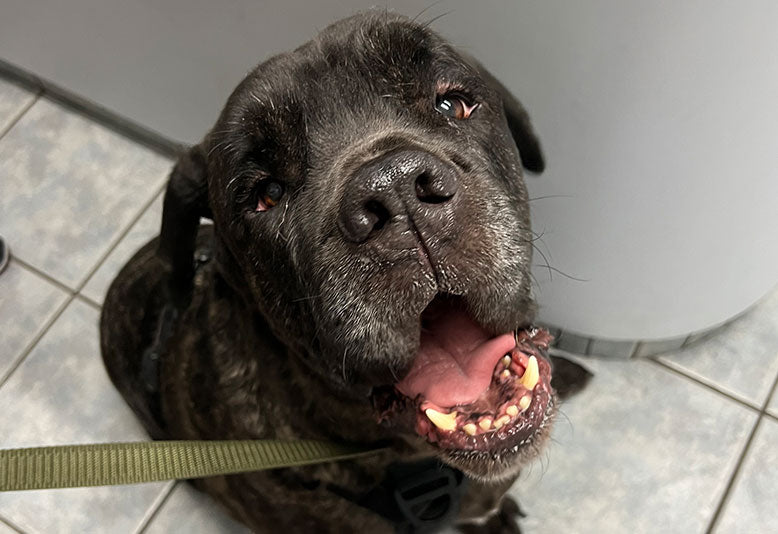
Fish Oil for Your Dog's Allergies: A Gentle Path to Comfort
It’s heartbreaking to watch the dog you love in a constant battle with their own skin. The endless scratching, the licking, the restless nights—we understand how helpless it can make you feel. You're searching for something that brings real comfort, and supplementing with fish oil for dogs allergies can be a wonderful, natural way to support them. It works gently from within to help maintain a calm and balanced response to those everyday triggers.
Understanding Your Dog's Constant Itching

If you've spent late nights searching for answers to your dog's relentless scratching, you're not alone. So many of us have been there. It's important to remember that this isn't just a quirky habit; it's a clear signal that their body is overreacting to something in their world.
Think of their immune system as a sensitive alarm. For a dog with allergies, that "itch alarm" can be triggered by things that should be harmless, creating discomfort that's hard to watch.
Common Triggers for the Itch Alarm
Everyday things can send your dog's system into overdrive, leading to the inflammation that makes their skin so itchy and uncomfortable. A few of the usual suspects include:
- Environmental Allergens: Things like pollen from grass, invisible dust mites in the carpet, or even mold spores can be big triggers, especially in certain seasons.
- Food Sensitivities: Sometimes, the food they eat can be part of the problem. Common proteins like chicken or beef, or even grains, can prompt an inflammatory reaction.
- Flea Bites: For a dog with a flea allergy, the saliva from just a single flea bite is enough to cause a widespread, intensely itchy response.
How Inflammation Causes Discomfort
When your dog encounters one of these triggers, their immune system sounds the alarm. It releases chemicals that create inflammation, which you see as redness, swelling, and that persistent itch. Their body is simply trying to defend itself from what it perceives as a threat.
The journey isn't just about stopping the scratching for a moment. It's about getting to the root of the problem and helping their body find balance again. Supporting their natural ability to manage inflammation is the key to lasting comfort.
This is where the omega-3 fatty acids in fish oil can play a supportive role. In one study with 16 dogs, those given fish oil showed a meaningful reduction in itching and a healthier, shinier coat compared to the dogs that didn't receive it.
Once you understand why your dog is so uncomfortable, you can explore gentle, effective ways to help them. Providing the right nutrients, like those in fish oil, helps support their body's ability to maintain a calmer response. For more ideas on boosting their resilience, you might find our guide on other immune supplements for dogs helpful.
Get Your FREE Dog Brain Health Guide

Get instant FREE access to today's top ways to help your best friend live a longer, healthier, happier life.
- 39 value-packed pages of expert insights
- Early-detection tips for cognitive decline
- Top brain-boosting superfoods
- Vet-approved mental sharpness strategies
- Fun IQ tests for your dog
How Fish Oil Helps Calm the Itch Alarm

Watching your dog struggle with allergies can feel like a fire alarm is constantly going off in your home. It’s relentless. You're just looking for a way to bring them some peace, and sometimes the answer is a gentle, natural approach. That's where fish oil for dog allergies comes in—it acts like a calm, steady hand, helping to turn down the volume on that alarm.
The real support comes from two specific omega-3 fatty acids: eicosapentaenoic acid (EPA) and docosahexaenoic acid (DHA). These are the key nutrients that help encourage a more balanced inflammatory response in your dog’s system.
When your pup encounters an allergen, their immune system can sometimes overreact. It releases a rush of inflammatory compounds that lead to the red, itchy skin and discomfort you see. It's just their body's way of trying to fight off what it mistakenly sees as a threat.
Supporting a Calmer System From Within
The omega-3s in fish oil work at a cellular level to help the body maintain a more peaceful state. They don't shut the immune system down. Instead, they provide the nutritional building blocks it needs to react more appropriately.
Think of it as giving your dog's internal "fire department" the right tools to handle a small spark, so they don't have to call in every truck for a minor incident.
This internal support works in two main ways:
- Promotes a Balanced Inflammatory Response: EPA is a real powerhouse here. It supports the body's natural pathways for managing inflammation, helping to soothe the irritation at its source.
- Strengthens the Skin Barrier: Your dog's skin is their first line of defense. Omega-3s help maintain the strength and integrity of that barrier, making it tougher for irritants to get through.
We know you're looking for real comfort, not just a temporary fix. The journey with fish oil is all about steady, consistent progress. It’s about giving their body the ongoing support it needs to handle allergies more effectively over time.
While progress takes time, this consistent support can lead to those small wins we all hope for. Maybe you'll notice your dog sleeping through the night without waking up to scratch, or they’ll seem more excited for their morning walk, no longer weighed down by constant irritation.
Every small improvement—from less redness on their belly to a healthier, shinier coat—is a step toward more good days together. This gentle, nutritional approach helps their body help itself, paving the way for the lasting comfort your best friend deserves.
Choosing the Right Fish Oil for Your Dog
Walking through the supplement aisle or scrolling online can feel overwhelming. With so many different bottles, it's hard to know which fish oil will actually help your itchy dog find comfort. The good news is, making a thoughtful choice is all about knowing what to look for.
We want to help you choose a high-quality supplement that can make a meaningful difference. It really comes down to three things: the right ingredients, purity, and a form your dog will happily take.
Look for Potency in EPA and DHA
Let's be clear: not all fish oils are the same. The real magic behind using fish oil for dogs allergies comes from two specific omega-3 fatty acids: EPA (eicosapentaenoic acid) and DHA (docosahexaenoic acid). These are the heavy lifters that support a balanced inflammatory response.
When you're comparing products, your eyes should scan for the amounts of EPA and DHA. Don't be fooled by a big number for "total fish oil." A quality supplement will clearly list the specific amounts of these two crucial ingredients.
This chart gives you a solid benchmark for what a potent fish oil supplement should offer.

As you can see, a supplement needs to deliver a meaningful dose of both fatty acids to really support your dog’s skin and coat health.
Purity and Sourcing Matter
Where the oil comes from is just as important as what’s in it. We recommend oils sourced from wild-caught, cold-water fish like salmon, sardines, and anchovies. Because these fish are lower on the food chain, they have a much lower risk of accumulating contaminants like heavy metals.
To be sure you're giving your dog a clean, safe product, look for a brand that uses third-party testing. This is your seal of approval—it means an independent lab has verified that the oil is free from contaminants and contains the EPA and DHA levels promised on the bottle. For a closer look at a great source, our guide on the benefits of Alaskan salmon oil for dogs is a great resource.
Every dog's journey with allergies is unique. But choosing a pure, potent supplement gives their body the best possible tool to find balance. It's a simple step that can make a world of difference in their day-to-day comfort.
Finding the Best Form for Your Dog
Finally, the most potent supplement is useless if your dog turns their nose up at it. Luckily, fish oil comes in a few different forms, so you can find one that fits your dog's preferences and your routine.
Here’s a quick guide to help you choose the best form of fish oil for your dog's needs and your convenience.
Comparing Fish Oil Supplement Types
| Supplement Type | Best For | Pros | Cons |
|---|---|---|---|
| Liquid Pumps | Dogs of all sizes, multi-dog households, and picky eaters. | Easy to dose and mix directly into food. | Can have a strong fishy smell and may need refrigeration. |
| Softgel Capsules | Dogs who will eat pills hidden in treats or food. | Mess-free, pre-measured doses with no fishy odor. | Can be tricky for dogs who are suspicious of pills. |
| Soft Chews | Dogs who love treats and owners seeking convenience. | Easy to give and often flavored to be more appealing. | May contain more additives or be lower in EPA/DHA than liquids. |
Think about what will work best for both of you. A picky eater might need the liquid mixed into their food, while a dog who loves treats might happily take a soft chew. No matter which you choose, you're making a wonderful move toward helping your best friend feel so much better.
Finding the Correct Fish Oil Dosage for Your Dog

One of the first questions on every dog parent's mind is, “How much fish oil should I give my dog?” It's a great question, because getting the amount just right can make all the difference.
There’s no single magic number. The ideal dose depends on your dog's weight, the severity of their symptoms, and—most importantly—the actual concentration of EPA and DHA in the supplement you're using. A more potent oil means you’ll need less to achieve the same supportive effect.
Start Low and Go Slow
The golden rule here is to start with a small amount and increase it gradually. This gentle approach gives your dog's digestive system a chance to adjust to the new supplement, which helps avoid an upset stomach.
We know you’re anxious to see your friend feel better, but patience is a key part of this journey. Think of it like introducing any new food; a slow and steady start helps make it a positive experience from day one.
General Starting Dosage Guide by Dog Weight
While your veterinarian is always the best resource for your dog's specific needs, it’s helpful to have a general idea of where to begin. These are common starting points to discuss with your vet. Remember, the right amount depends on the EPA/DHA concentration in your chosen supplement.
| Dog Weight | Suggested Starting EPA+DHA Daily Dose |
|---|---|
| Under 15 lbs | 250 - 500 mg |
| 15 - 30 lbs | 500 - 1,000 mg |
| 30 - 60 lbs | 1,000 - 2,000 mg |
| Over 60 lbs | 1,500 - 3,000 mg |
Just remember, these numbers refer to the combined total of EPA and DHA, not the total amount of fish oil. Always check the label on your product for the specific concentration.
A study from the University of Florida highlighted how important proper dosing is. Researchers found that dogs often need higher doses of omega-3s than we do to see real skin benefits. In their study, dogs on a higher dose saw a 38% decrease in itching and a 45% decrease in hair loss. You can read more about these findings on canine skin conditions.
Remember, the goal is to find the lowest effective dose that brings your dog comfort. Small improvements matter, and consistent support is what helps create more good days together.
Keep a close eye on your dog for any changes. You're looking for positive signs like less scratching, but also for any hints of digestive upset. If you notice loose stools, just scale back the amount for a few days before trying to slowly increase it again.
For more helpful tips on supporting your dog from the inside out, check out our other articles on canine nutrition and supplements. By working with your vet, you can find the perfect amount to help your best friend feel comfortable in their own skin again.

Support Your Dog's Brain Health with NeuroChew™
As mentioned in this article, NeuroChew is the first dog chew designed to support both cognitive function and healthy circulation. Perfect for dogs showing early signs of cognitive decline or for proactive brain health support.

Real Results: How NeuroChew Helped Brutus Regain His Mental Clarity
Brutus was getting disoriented at night. After starting NeuroChew, he's more happy during the day and steady at night. He's back to his old self!
What to Expect on Your Journey to Relief
When you start your dog on a new supplement, you're hoping to see them feel better quickly. We get it completely. But when using fish oil for dogs allergies, it's helpful to think of it as a journey, not a race. You're giving their body the building blocks it needs to rebalance itself from the inside out, and that takes a little time.
Patience is your best friend here. The omega-3 fatty acids need to build up in your dog's system to begin their work at a cellular level. While every dog responds differently, many families start to see subtle but positive shifts within 4 to 6 weeks of consistent, daily use.
Celebrating the Small Wins
Instead of looking for an overnight miracle, the real goal is to start noticing more "good days" than challenging ones. Progress often appears in small, quiet moments that mean everything.
Keep an eye out for these encouraging signs that you're on the right path:
- Peaceful Nights: One of the first changes you might see is your dog sleeping through the night without waking up to scratch or chew. That uninterrupted rest is golden.
- Less Scratching: You might suddenly realize the constant jingle of their collar has gone quiet. The frantic daytime scratching may start to become less frequent.
- A Spark of Joy: A dog that isn't constantly uncomfortable is a happier dog. Maybe they'll start nudging their favorite ball into your hand again or show more excitement for a walk.
- Healthier Skin and Coat: Over a few weeks, you may start to see less angry, red skin. Eventually, their coat may grow back softer, shinier, and healthier than before.
We measure success in moments of comfort. Each peaceful night's sleep and every joyful wag of the tail is a victory worth celebrating on this journey together.
Remember, you're not just waiting for a single moment of perfection. Providing a high-quality fish oil is a powerful, loving act that helps your dog feel more comfortable in their own skin, one day at a time. Every small improvement is a testament to your care and a step toward the lasting relief they deserve.
A Few Common Questions About Fish Oil
It's smart to ask questions when you're looking for the best way to help your dog feel better. You're not alone in this journey. Let's walk through some of the most common things dog parents wonder about when starting fish oil.
Can I Just Give My Dog My Own Fish Oil Capsules?
That's a question we hear all the time, and it's a good one. While it might seem easier, human fish oil supplements aren't the best choice for our dogs. They can have coatings or flavorings that might upset a dog's stomach. Plus, the EPA and DHA levels are formulated for human bodies, not canine ones.
More importantly, some human supplements can contain ingredients that are toxic to dogs, like the sweetener xylitol. To be safe and get the best results, it's always best to use a product made specifically for dogs.
How Long Until I See a Difference in My Dog's Itching?
Patience is so important here. Fish oil is not a quick fix; it works from the inside out, gradually building up in your dog's system to help calm inflammation. It needs a little time to work.
Most people start seeing those first positive signs—like a little less scratching at night—within 4 to 8 weeks of consistent, daily use. The real secret is consistency. Giving it every single day is what allows those supportive omega-3s to do their job.
Think of it less as an instant fix and more about creating more good days for your dog. Every small win, like a calmer evening or a renewed interest in their favorite toy, is a big step forward on this journey together.
Should I Be on the Lookout for Any Side Effects?
Fish oil is generally very safe for dogs, but it's always smart to pay attention when you introduce anything new. The most common issue is a bit of digestive upset, which usually only happens if you start with too high a dose too quickly.
The "start low and go slow" method is the best way to avoid this. Begin with a small amount and gradually work your way up to the full recommended dose over a week or two. This gives your dog’s system time to adjust. If you do notice any loose stool, just reduce the amount and have a chat with your vet.
What If I Accidentally Miss a Dose?
Don't worry! Life happens, and missing a single dose won't undo all your progress. The benefits of fish oil come from its steady, long-term presence in your dog's body.
If you forget one, just continue with the next dose at the usual time. Just don't double up to try and make up for it, as that could cause an upset tummy. Simply get back into your daily routine, and you'll be right back on track.
Is Fish Oil Going to Make My Dog Gain Weight?
It's great that you're thinking about this! A healthy weight is so important for a dog's well-being. The good news is that the number of calories in a typical dose of fish oil is very small and won't cause weight gain.
For perspective, a standard 1,000 mg fish oil softgel has only about 9 calories. A 50-pound dog might eat over 1,000 calories a day, so the oil's contribution is minimal. As long as you're feeding a healthy diet and getting in plenty of activity, fish oil will only support your dog's health.
At Furever Active, our goal is to support your dog’s health with natural, gentle solutions you can feel good about. We create our supplements to help you and your best friend share more happy, comfortable days together. You can check out our full line of products designed for your dog’s well-being at https://fureveractive.com.
Share This Article

Support Your Dog's Brain Health with NeuroChew™
The first dog chew that supports both brain function and healthy circulation. Perfect for dogs of all ages.
- Enhances cognitive function & mental clarity
- Reduces anxiety without sedation
- Supports healthy blood circulation
- Made in USA with natural ingredients
60-Day Money-Back Guarantee • Free Shipping








